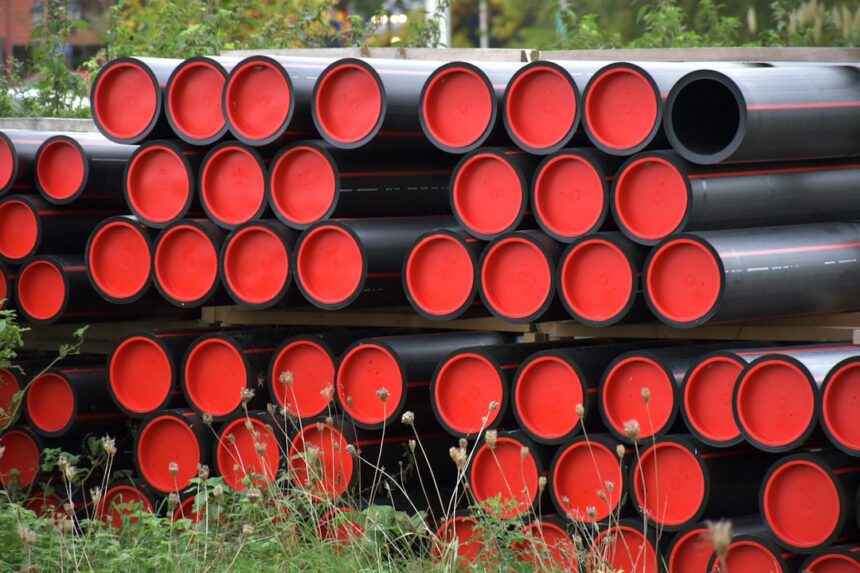Pipeline destruction has emerged as a significant issue in contemporary discussions surrounding energy infrastructure, environmental protection, and social justice. The act of dismantling or sabotaging pipelines, often carried out by activists or in response to natural disasters, raises complex questions about the balance between energy needs and ecological preservation. Pipelines are critical for transporting oil and gas across vast distances, but their construction and operation can lead to severe environmental degradation, including oil spills, habitat destruction, and greenhouse gas emissions.
As the world grapples with the urgent need to transition to sustainable energy sources, the destruction of pipelines has become a focal point for debates on energy policy and environmental ethics. The motivations behind pipeline destruction are varied and often deeply rooted in concerns over climate change, indigenous rights, and the protection of natural resources. Activists argue that the continued reliance on fossil fuels is incompatible with the urgent need to mitigate climate change impacts.
In this context, pipeline destruction is seen not merely as an act of vandalism but as a form of protest against an energy system that many perceive as outdated and harmful. This article will explore the multifaceted implications of pipeline destruction, examining its impact on environmental activists, economic factors for oil and gas companies, effects on local communities, political ramifications, and opportunities for renewable energy.
Key Takeaways
- Pipeline destruction poses a significant threat to the environment and public safety, often resulting in oil spills and other hazardous incidents.
- Environmental activists face increased risks and challenges as they advocate against pipeline construction and operation, often facing legal and physical threats.
- Oil and gas companies may suffer economic losses due to pipeline destruction, including cleanup costs, legal fees, and reputational damage.
- Local communities and indigenous peoples are disproportionately affected by pipeline destruction, facing potential health and environmental hazards.
- Governments and policymakers may face political backlash and pressure to address pipeline destruction, potentially leading to shifts in energy policies and regulations.
Impact on environmental activists
For environmental activists, pipeline destruction serves as both a rallying cry and a tactical maneuver in the fight against fossil fuel dependency. The act of destroying or obstructing pipelines is often framed as a necessary response to the existential threat posed by climate change. Activists argue that traditional forms of protest have proven insufficient in the face of an urgent crisis, prompting them to adopt more radical measures.
This shift in strategy has galvanized a diverse coalition of individuals and organizations committed to environmental justice, indigenous rights, and climate action. However, the consequences of such actions are not without risks. Environmental activists often face legal repercussions, including arrests and criminal charges, which can deter participation in future protests.
Moreover, the public perception of these actions can be polarizing; while some view them as heroic acts of resistance, others see them as reckless endangerment of public safety and property. This dichotomy complicates the narrative surrounding pipeline destruction and highlights the challenges activists face in garnering widespread support for their cause.
Economic implications for oil and gas companies

The destruction of pipelines carries significant economic implications for oil and gas companies that rely on these infrastructures for their operations. When a pipeline is damaged or destroyed, it can lead to substantial financial losses due to halted production, costly repairs, and potential legal liabilities. Companies may also face increased scrutiny from investors and regulators concerned about environmental risks and sustainability practices.
In an era where corporate responsibility is increasingly prioritized by consumers and stakeholders alike, the economic fallout from pipeline destruction can extend beyond immediate losses to long-term reputational damage. Furthermore, the rising frequency of pipeline protests and sabotage can lead to heightened security measures and increased operational costs for oil and gas companies. These companies may find themselves investing more in surveillance technologies and security personnel to protect their assets from potential threats.
As a result, the overall cost structure of these businesses may shift, prompting them to reassess their strategies in light of growing public opposition to fossil fuel projects. This economic pressure could ultimately influence corporate decisions regarding future investments in renewable energy or alternative infrastructure.
Effects on local communities and indigenous peoples
| Community | Impact |
|---|---|
| Displacement | Forced relocation of indigenous peoples |
| Loss of livelihood | Decreased access to natural resources |
| Cultural impact | Erosion of traditional practices and beliefs |
| Health impact | Increased exposure to pollution and health risks |
The effects of pipeline destruction are particularly pronounced in local communities and among indigenous peoples who often bear the brunt of environmental degradation associated with fossil fuel extraction and transportation. Many indigenous groups have long opposed pipeline projects that threaten their ancestral lands, water sources, and cultural heritage. The destruction of pipelines can be seen as a form of resistance against colonial practices that have historically marginalized these communities.
For them, the fight against pipelines is not just about environmental protection; it is also about asserting their rights and sovereignty. However, the consequences of pipeline destruction can be double-edged for local communities. While some may support these actions as a means of protecting their land and resources, others may fear the economic repercussions that come with disrupted energy supplies or damaged infrastructure.
The tension between environmental activism and economic stability can create divisions within communities, complicating efforts to build consensus around energy policies.
Political ramifications for governments and policymakers
The issue of pipeline destruction has significant political ramifications for governments and policymakers tasked with navigating the complex landscape of energy regulation and environmental protection. As public awareness of climate change grows, there is increasing pressure on governments to take decisive action against fossil fuel dependency. This pressure often manifests in calls for stricter regulations on pipeline construction and operation, as well as greater investment in renewable energy sources.
Policymakers must grapple with balancing economic interests tied to fossil fuels with the urgent need for climate action. Moreover, pipeline destruction can serve as a catalyst for broader political movements advocating for systemic change in energy policy. Activist groups often leverage high-profile acts of sabotage to draw attention to their causes, mobilizing public support for legislative reforms aimed at reducing reliance on fossil fuels.
This dynamic can create a sense of urgency among policymakers to respond to grassroots demands for change. However, it also poses challenges; governments may face backlash from industry stakeholders who argue that such actions threaten jobs and economic stability.
Opportunities for renewable energy and alternative infrastructure

In the wake of pipeline destruction, there lies a unique opportunity for the advancement of renewable energy solutions and alternative infrastructure development. As public sentiment shifts away from fossil fuels, there is growing recognition of the need to invest in sustainable energy sources such as solar, wind, and hydroelectric power. The dismantling of pipelines can serve as a symbolic turning point in the transition toward cleaner energy systems.
It highlights the urgency of reimagining energy infrastructure that prioritizes environmental sustainability over short-term profits. Investing in renewable energy not only addresses climate concerns but also presents economic opportunities for innovation and job creation in emerging sectors. As governments seek to diversify their energy portfolios, they may allocate resources toward research and development initiatives aimed at advancing clean technologies.
Consequences for energy consumers
The consequences of pipeline destruction extend beyond industry stakeholders; they also significantly impact energy consumers who rely on stable access to affordable energy sources. Disruptions caused by pipeline damage can lead to fluctuations in energy prices, affecting households and businesses alike. When supply chains are interrupted due to sabotage or natural disasters, consumers may experience higher costs or limited availability of essential resources like heating oil or natural gas.
Moreover, as public awareness grows regarding the environmental impacts associated with fossil fuel consumption, consumers are increasingly seeking alternatives that align with their values. This shift in consumer behavior can drive demand for renewable energy options such as solar panels or electric vehicles. Consequently, energy companies may need to adapt their offerings to meet changing consumer preferences while navigating the challenges posed by pipeline destruction.
Ramifications for global energy markets
The ramifications of pipeline destruction resonate throughout global energy markets, influencing supply chains and geopolitical dynamics. As countries strive for energy independence and security, disruptions caused by pipeline sabotage can have far-reaching effects on international relations. Nations heavily reliant on imported fossil fuels may find themselves vulnerable to supply shocks resulting from damaged infrastructure in exporting countries.
Additionally, the growing trend of pipeline destruction can prompt shifts in investment patterns within global energy markets. Investors may become increasingly wary of funding fossil fuel projects perceived as high-risk due to potential sabotage or regulatory changes driven by climate activism. This shift could accelerate the transition toward renewable energy investments as stakeholders seek more stable and sustainable opportunities in an evolving market landscape.
Implications for national security and geopolitical dynamics
Pipeline destruction raises critical questions about national security and geopolitical dynamics in an era marked by increasing competition over resources. Countries that depend on pipelines for energy transportation must consider the vulnerabilities associated with their infrastructure. Sabotage or attacks on pipelines can disrupt not only domestic supply chains but also international relations between nations reliant on shared energy resources.
Furthermore, geopolitical tensions may arise as countries navigate competing interests related to fossil fuel extraction and transportation. Nations with significant oil reserves may find themselves at odds with those advocating for climate action or seeking to reduce dependence on fossil fuels altogether. The interplay between national security concerns and environmental activism complicates diplomatic efforts aimed at fostering cooperation in addressing global energy challenges.
Effects on job creation and employment in the energy sector
The destruction of pipelines has profound implications for job creation and employment within the energy sector. While some may argue that acts of sabotage threaten jobs tied to fossil fuel industries, others contend that transitioning away from fossil fuels presents opportunities for new employment avenues in renewable energy sectors. As traditional oil and gas jobs face uncertainty due to pipeline disruptions or regulatory changes, workers may need retraining or reskilling to adapt to emerging industries focused on sustainability.
Moreover, investments in renewable energy infrastructure can lead to job creation across various sectors—from manufacturing solar panels to installing wind turbines—offering pathways for displaced workers seeking new opportunities. Policymakers play a crucial role in facilitating this transition by implementing programs that support workforce development initiatives aimed at equipping individuals with skills relevant to the evolving energy landscape.
Potential for innovation and investment in sustainable energy solutions
Pipeline destruction underscores the urgent need for innovation and investment in sustainable energy solutions capable of addressing climate change while meeting global energy demands. As public awareness grows regarding the environmental impacts associated with fossil fuel consumption, there is increasing recognition of the importance of developing cleaner alternatives that prioritize ecological integrity. Investors are beginning to shift their focus toward renewable technologies capable of providing reliable energy without compromising environmental health.
This trend presents opportunities for startups and established companies alike to innovate new solutions that enhance efficiency while reducing carbon footprints. By fostering an environment conducive to research and development initiatives aimed at advancing sustainable technologies, stakeholders can contribute meaningfully toward building a resilient future powered by clean energy sources. In conclusion, pipeline destruction serves as a multifaceted issue with far-reaching implications across various domains—from environmental activism to economic stability and geopolitical dynamics.
As society grapples with the challenges posed by climate change and fossil fuel dependency, understanding these complexities becomes essential for navigating an increasingly interconnected world where sustainable solutions are paramount for future generations.
In the complex geopolitical landscape, the destruction of pipelines often raises questions about who stands to gain from such actions. An insightful article on this topic can be found on the website “In The War Room.” The article delves into the various stakeholders involved, from governments to private entities, and examines the potential benefits they might reap from pipeline disruptions. For a deeper understanding of these dynamics, you can read the related article by visiting In The War Room. This resource provides a comprehensive analysis of the strategic interests at play and the broader implications for global energy markets.
WATCH THIS! The FSB’s Hidden War on Europe’s Pipelines
FAQs
What is the pipeline destruction?
The pipeline destruction refers to the intentional damage or destruction of pipelines used for transporting oil, natural gas, or other resources.
Who benefits from the pipeline destruction?
The beneficiaries of pipeline destruction can vary depending on the specific circumstances. In some cases, environmental activists or indigenous communities may benefit from halting the flow of fossil fuels and protecting their land. However, there can also be negative consequences for local communities and the economy.
What are the potential consequences of pipeline destruction?
The consequences of pipeline destruction can include environmental damage, disruption of the energy supply, economic losses for companies and communities, and potential safety hazards.
Are there legal implications for pipeline destruction?
Yes, pipeline destruction is illegal and can result in criminal charges and financial penalties for those responsible. Additionally, it can lead to civil lawsuits and damage claims from affected parties.
How does pipeline destruction impact the energy industry?
Pipeline destruction can disrupt the flow of resources and impact the energy industry by causing supply shortages, increased costs, and delays in production and distribution. This can have far-reaching effects on the economy and energy markets.




